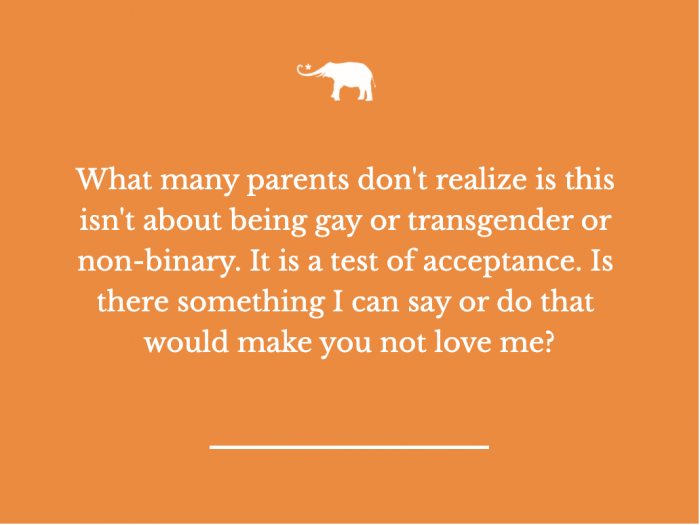It usually starts with an email: please call me by a different name. I’m non-binary. My parents don’t know. Teachers, we are the safe people. I am not going to question it or have a big, long conversation about it. I simply hit reply and offer my standard response: Thank you for letting me know. I support you and I want to do whatever feels comfortable. Should I make a brief announcement to let other students know how to address you or should I just start using your new pronouns/name in class without an explanation?
Most don’t want an announcement. They want their new identity to quietly slip in between the morning announcements and their algebra problems. They are testing the waters with their new identity, in a pretty precarious place: high school. Although my high school is in a conservative, small town, we have enough transgender and non-binary students that it isn’t out of the ordinary for a student to show up after winter break or a long weekend with a new haircut and a new name.
But what about the parents of these teens? Some aren’t even aware of the new identity. One student was clear with me: my parents still think I’m Taylor, so don’t use Oliver when you talk to them. Many schools have the policy of respecting the student’s wishes for how they want to be addressed in school, but cannot change the name on a legal document. So report cards and official correspondence have the name with which the student registered.
In many cases, parents are in the dark because kids fear their reactions. One student agonized for months about telling her mom she was gay. She would eat lunch in my room and tell me the off-handed comments her mom would make: that no one would care about being gay, except they shoved it in people’s faces, that gay men’s voices were annoying, that girls should look feminine and not wear workout clothes out. My student had no idea how her mom would react. Would she be able to embrace her daughter despite the homophobic undertones?
Another student told their parents they were transgender. They threatened to kick them out. Under no uncertain terms, they had to “remain” a girl, or they would need to find a new place to live. A sophomore boy, who was known as a helpful, mature kid to his teachers, came out to his dad. His dad told him he didn’t like it, but as long as he didn’t talk about it, he could handle it.
What many parents don’t realize is this isn’t about being gay or transgender or non-binary. It is a test of acceptance. Is there something I can say or do that would make you not love me? That is the question they are asking. Many parents fail this test. As a parent myself, I understand the attachment we have to our child’s identity as we perceive it. After all, this is the baby we’ve nurtured and protected. We’ve chosen his or her name, curated this little person’s experiences, and tried to influence him or her with our example. We are deeply invested in his or her identity, unlike the teachers or classmates who can adapt without much fanfare.
But really, all of parenting and especially adolescence, is taking step after baby step away from your child. Less of your vision, more of theirs. Less of your manual of how they should should look and act, and more of their blossoming individuality. Their confidence, and ultimately happiness as an adult, depends on it. As a teacher, I love watching students become more of who they are. As a parent, it is imperative that we do the same, even when it makes us uncomfortable.
So, parents: embrace it. Embrace it because you are more invested in their well-being than your vision of who they should be.
For more on parenting teens, visit my website at www.translatingteens.org.











Read 0 comments and reply